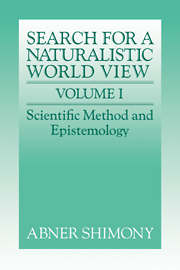12 - On Martin Eger's “A tale of two controversies”
Published online by Cambridge University Press: 21 December 2009
Summary
Criticisms are presented against Eger's challenge to the demarcation between the natural sciences and ethics. Arguments are given both against his endorsement of the “new” philosophy of science and against his rejection of the fact-value dichotomy. However, his educational recommendations are reinforced rather than weakened by these criticisms.
Martin Eger's essay is extraordinarily rich in penetrating philosophical comments and in educational good sense. Nevertheless, I believe that there are serious errors in his fundamental philosophical theses, and much of this commentary will be devoted to exhibiting them. I shall then try to show that for the most part his educational recommendations are reinforced rather than weakened by my theoretical criticisms.
“NEW” AND “OLD” PHILOSOPHY OF SCIENCE
Eger challenges the demarcation of the natural sciences from the study of morals by questioning that they are different cognitively. The demarcation was clear and strict, he says, as long as an old, essentially positivist conception of the natural sciences was maintained and as long as the factvalue dichotomy was accepted. The “new philosophy of science,” however, has profoundly criticized the old conception, and in spite of some reservations Eger on the whole assents to these criticisms.
- Type
- Chapter
- Information
- The Search for a Naturalistic World View , pp. 321 - 328Publisher: Cambridge University PressPrint publication year: 1993



